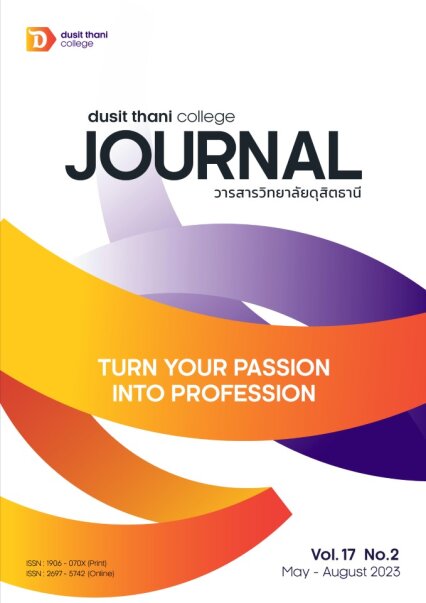The Tourist Satisfaction and Economic Impact in Thailand Master Games 2023
Main Article Content
Abstract
การวิจัยครั้งนี้มีวัตถุประสงค์เพื่อศึกษาความพึงพอใจของนักท่องเที่ยวเชิงกิจกรรมกีฬาและผลกระทบทางเศรษฐกิจที่เกิดขึ้นจากการจัดการแข่งขันกีฬาผู้อาวุโสนานาชาติ ไทยแลนด์มาสเตอร์เกมส์ 2023 ณ จังหวัดชลบุรี โดยวิธีดำเนินการวิจัยเป็นการวิจัยเชิงปริมาณ ใช้แบบสอบถามในการเก็บข้อมูลจากนักท่องเที่ยวเชิงกิจกรรมกีฬาจำนวน 400 คน ที่มาเข้าร่วมการแข่งขันไทยแลนด์มาสเตอร์เกมส์ 2023 โดยผลการวิจัยพบว่า นักท่องเที่ยวเชิงกิจกรรมกีฬามีความพึงพอใจในการแข่งขันกีฬาอาวุโสนานาชาติ ไทยแลนด์มาสเตอร์เกมส์ 2023 ภาพรวมอยู่ในระดับมาก มีค่าเฉลี่ยเท่ากับ 4.14 โดยด้านที่มีความพึงพอใจสูงสุด คือ ด้านลักษณะทั่วไปของรายการแข่งขันที่มีความสวยงาม สามารถเดินทางเข้าถึงง่ายและสะดวก รวมถึงมีมาตรฐานความปลอดภัยที่ดี และสภาพอากาศในขณะจัดการแข่งขันสามารถคาดเดาได้ง่าย นอกจากนี้การแข่งขันไทยแลนด์มาสเตอร์เกมส์ 2023 สามารถสร้างผลกระทบทางเศรษฐกิจได้สูงถึง 266,055,410 บาท ซึ่งส่งผลกระทบโดยตรงที่ดีต่อด้านความยั่งยืนทางเศรษฐกิจและเกิดการหมุนเวียนของเม็ดเงินมหาศาลในระดับชุมชนและระดับประเทศ ซึ่งถือเป็นการกระตุ้นเศรษฐกิจด้านการท่องเที่ยวได้เป็นอย่างดี
Article Details

This work is licensed under a Creative Commons Attribution-NonCommercial-NoDerivatives 4.0 International License.
Article Screening Policy
- All research and academic articles to be published must be considered and screened by three peer reviews in the relevant field / article.
- All articles, texts, illustrations and tables published in the journal are the personal opinions of the authors. Editors don't always have to agree. And no responsibility whatsoever is the sole responsibility of the author.
- The articles to be published must never be published. Where did you first publish? And not in the consideration of other journals If the audit found that there has been a duplicate publication It is the sole responsibility of the author.
- Any article that the reader sees as being plagiarized or impersonated without reference. Or mislead the work of the author Please let the journal editor know it will be your greatest blessing.
References
Agha, N. and Taks, M. (2015). A theoretical comparison of the economic impact of large and small events. International Journal of Sport Finance, 10(3), 199-216.
Asmit, B., Syahza, A., Mahdum, A., and Riadi, R. M. (2020). Opportunities and prospect for tourism development on rupat island, indonesia. Folia Geographica, 62(2), 133-148.
Crompton, J. L., Jeong, J. Y., and Dudensing, R. M. (2016). Sources of variation in economic impact multipliers. Journal of Travel Research, 55(8), 1051-1064.
Cronbach, L. J. (1970). Essentials of psychological testing. 3rd ed. New York: Harper & Row.
Dionigi, D. (2006) Competitive Sport as Leisure in Later Life: Negotiations, Discourse, and Aging, Leisure Sciences, 28(2), 181-196, DOI: 10.1080/01490400500484081
Economics, Tourism and Sports Division, Office of the Permanent Secretary for Tourism and Sports. (2019). Summary report on the risk management of World Motorcycle Championship Moto GP 2019. Ministry of Tourism and Sports.
Getz, D. (2008). Event tourism: Definition, evolution, and research. Tourism Management, 29, 403-428. DOI: https://doi.org/10.1016/j.tourman.2007.07.017
Ghaderi, Z., Saboori, B. And Khoshkam, M. (2017). Does security matter in tourism demand?. Current Issues in Tourism, 20(6), 552-565.
Good, K. J. (1973). Social facilitation: Effects of performance anticipation, evaluation, and response competition on free associations. Journal of Personality and Social Psychology, 28(2), 270.
Kirkup, N. and Sutherland, M. (2017). Exploring the relationships between motivation, attachment, and loyalty within sport event tourism. Current Issues in Tourism, 20(1), 7-14. DOI: https://doi.org/10.1080/13683500.2015.1046819
Kotler, P. (2003). Marketing Management (11th ed.). Englewood Cliffs, NJ: Prentice Hall
Kotler, P., and Keller, K. L. (2006). Marketing management 12e. Upper Saddle River, NJ: Pears Education.
Millet, J. D. (1954). Management in the public service: The quest for effective performance. McGraw-Hill.
Muskat, B., Hörtnagl, T., Prayag, G., & Wagner, S. (2019). Perceived quality, authenticity, and price in tourists’ dining experiences: Testing competing models of satisfaction and behavioral intentions. Journal of Vacation Marketing, 25(4), 480-498.
Naylor, J. and Blum, M. (1986). Industrial Psychology: Its Theoretical and Social Foundation, Harper and Row.
Perić, M., & Tanković, A. (2021). Investigating the satisfaction of active event sport tourists. European Journal of Tourism Research, 28, 2806-2806.
Pholvichai, T. and PhoThong, P. (2018). An Analysis of Economic and Social Value for Sport Tourism Events. University of the Thai Chamber of Commerce, 1051-1068.
Pisarnbutr, S. (2008). Marketing research. Bangkok: Withayapat Publishers.
Rusu, S. (2011). Tourism multiplier effect. Journal of Economics and Business Research, 17(1), 70-76.
Sari, T. N. (2015). The potency of Jakabaring Sport City as a sport tourism attraction in Palembang. Doctoral dissertation, State polytechnic of Sriwijaya.
Sevatapukka, S. (2019). Tourism multiplier and income distribution: empirical evidences from hotel-level data in Thailand. Development Economic Review (DER), 13(1), 63-83


